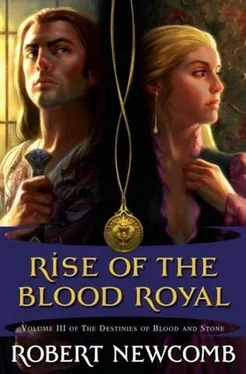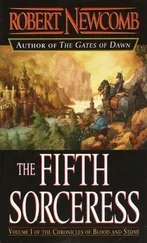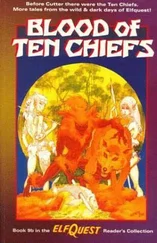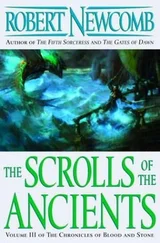Robert Newcomb - Rise of the Blood Royal
Здесь есть возможность читать онлайн «Robert Newcomb - Rise of the Blood Royal» весь текст электронной книги совершенно бесплатно (целиком полную версию без сокращений). В некоторых случаях можно слушать аудио, скачать через торрент в формате fb2 и присутствует краткое содержание. Жанр: Фэнтези, на английском языке. Описание произведения, (предисловие) а так же отзывы посетителей доступны на портале библиотеки ЛибКат.
- Название:Rise of the Blood Royal
- Автор:
- Жанр:
- Год:неизвестен
- ISBN:нет данных
- Рейтинг книги:4 / 5. Голосов: 1
-
Избранное:Добавить в избранное
- Отзывы:
-
Ваша оценка:
- 80
- 1
- 2
- 3
- 4
- 5
Rise of the Blood Royal: краткое содержание, описание и аннотация
Предлагаем к чтению аннотацию, описание, краткое содержание или предисловие (зависит от того, что написал сам автор книги «Rise of the Blood Royal»). Если вы не нашли необходимую информацию о книге — напишите в комментариях, мы постараемся отыскать её.
Rise of the Blood Royal — читать онлайн бесплатно полную книгу (весь текст) целиком
Ниже представлен текст книги, разбитый по страницам. Система сохранения места последней прочитанной страницы, позволяет с удобством читать онлайн бесплатно книгу «Rise of the Blood Royal», без необходимости каждый раз заново искать на чём Вы остановились. Поставьте закладку, и сможете в любой момент перейти на страницу, на которой закончили чтение.
Интервал:
Закладка:
“The full moons are here,” Vespasian said. “I trust that the Vagaries flame has been replenished and that should I visit the Rotunda, I would find it in vibrant stead?”
“Yes, Your Highness,” Julia answered. “The flame burns strongly again. All is well with the craft.”
“Thank you, Femiculi,” Vespasian said. “Do you wish to inform the Suffragat of any worthy supplications proposed by the citizens?”
“Not at this time, Highness,” she answered.
“Very well,” Vespasian said. “You may be seated.”
Unlike the commanding way he behaved toward thePon Q’tar and the military, Vespasian always treated the Priory members with utmost courtesy. There were two reasons for this.
First, his respect for the Priory was genuine. The vows of chastity required to join the Priory were taken willingly, and becoming a Priory member was considered a great honor. The vows were an act of faith and central to the women’s beings. Should a Sister be caught breaking her vows, the penalty was death. By law, the method of execution was ritual sacrifice, performed on the black altar standing before the Vagaries flame.
In the entire history of the empire, this punishment had never been needed. Even so, the vows of chastity were more than a sacred discipline that the Sisters were obliged to follow. They also symbolized a guiding principle for the populace at large and gave them faith. The citizenry believed that so long as the Priory Sisters remained pure, so would the Vagaries flame that they tended and protected. As went the life of the flame, so did the life of the nation.
The second reason for Vespasian’s cultivation of the Priory was more pragmatic. Of the three Suffragat factions, the Priory was the one most attuned to the will of the people. Only Julia Idaeus heard the supplications of the citizens, rather than Vespasian, thePon Q’tar, or the military. The needs expressed by the citizens that Julia deemed worthy of debate were relayed to the Suffragat. If the Suffragat agreed, the request was discussed and a vote was taken. Having the Femiculi’s ear was a potent advantage in advancing one’s fortunes. People had been known to come from thousands of miles away for a mere chance of being granted an audience with Julia Idaeus. Sometimes the eager pilgrims succeeded, sometimes they did not.
Eager to move on, Vespasian looked at Gracchus. “I will now read the latest treasury report,” he ordered.
Gracchus signaled to a skeen who rushed down the aisle and toward his side. After the cleric gave the skeen a large diptych, the servant hurried down to the Aedifficium floor. Reaching Vespasian’s chair, he went down on one knee, bowed his head, and reverently handed the gold and beeswax book up to his emperor. After taking it, Vespasian waved the skeen away.
While the council waited, Vespasian read the report. The gold tally had deteriorated to a level that was worse than he had expected. Gracchus was right, he realized. The treasury situation was indeed dire. Would there be enough to finance his new plan? he wondered.
Rustannica’s pecuniary troubles had started more than one century ago, during the reign of one of Vespasian’s predecessors. It had been his desire to greatly widen the war, hoping to finally bring it to an end. By a narrow vote, the Suffragat had agreed. But in their rush toward final victory, they had grossly underestimated the financial costs to the empire. In a way, Rustannica was a victim of her own military successes against Shashida. The Suffragat was painfully aware that the war was only one part of the problem. The far greater threat was the nation’s dwindling gold supply.
As was the case in Shashida, gold was the Rustannican currency. By law, the treasury was supposed to hold a reserve of gold that was at least equal to the value of the gold coins circulating the nation. Unknown by the populace, the law was being wantonly violated by the same Suffragat members who had sworn to uphold it, providing yet another reason to heavily censor the session reports. When an inordinate amount of the treasury reserves were used to intensify the war, the Suffragat’s gamble had won out-but not in the way that they had hoped. As the pace and scope of Rustannica’s war against Shashida was stepped up, great tracts of Shashidan territory were won. But soon the campaign became a hollow victory, for the spoils taken from those lands were disappointing.
In truth, the Suffragat did not know whether the reputed Shashidan gold hoards had been only rumor, or whether they had existed and had been hurriedly moved to safety ahead of the advancing Rustannican legions. The Suffragat suspected the latter. Worse, they also guessed that the Shashidan military had been forewarned of the new offensive by a spy in their midst, giving the Shashidans time to move their gold. The traitor had never been found.
Because of her greatly accelerated campaign, Rustannica had overextended herself. Soon the cost of maintaining the war was proving too great even for the mighty empire to sustain. But the Suffragat dared not abandon the new lands that she had conquered, for Shashidan cohorts would quickly overrun the area and reclaim the empire’s newest source of slaves and added taxation.
Ninety years ago, a change from gold coins to parchment script had been ordered in a try to prop up the treasury, but the experiment was short-lived. The paper script was quickly rejected by the populace and angry mobs literally burned the new money in the streets. Rustannicans liked the sound of coins jingling in their pockets, and only gold’s heavy weight and unique texture sustained the people’s confidence in the economy’s well-being.
For a time, thePon Q’tar, had tried to augment the gold supply by way of the craft. But that project also failed, because even the revered mystics could not conjure gold in sufficient quantities to make an appreciable difference. The empire had tried reducing the amount of gold in the coins, but the public soon caught on and another outcry arose. Worse yet, the Rustannican gold mines were nearing exhaustion and no new deposits had been unearthed for decades. For the first time in the history of Rustannica, her gold supply was nearing a finite amount.
The Suffragat briefly considered stripping all the gold from the public buildings to augment the treasury, but they quickly realized that such a brazen move would only confirm the public’s growing suspicions. Moreover, as the population grew, so did the needs of the goldsmiths. Melted and crafted into jewelry, yet more irreplaceable gold was being worn as adornments and buried with the dead that would never find its way back into circulation. For a time the Suffragat actually flirted with the prospect of grave robbing, but the idea was eventually dismissed as too risky and unworkable. While the public worried and wondered, the smell of revolt drifted into the air. Something had to be done to placate the masses while an answer could still be found.
And so, seventy years ago, for better or worse, the great coliseum had been built to distract the mob from Rustannica’s constantly rising inflation, ongoing war, and ever-increasing tax rates. But soon the massive costs associated with the grisly theater of death had brought the reverse effect and made matters worse.
Like Rustannica’s offensive campaign, the coliseum had been wildly successful on the surface, but it soon created more problems than it solved. The games had become an institution and millions of people now relied on them to make a living. The spectacle employed countless centurions, horse breeders, chariot and wagon builders, animal trainers, slave traders, architects, surgeons, armorers, and untold other types of laborers. Shippers, contractors, and other businessmen also relied heavily on the games.
Not to be outdone, a high percentage of Ellistium’s prostitutes counted on the debauchery of the games to supply them with drunken customers who might not otherwise use their services. The men’s and women’s incomes were heavily taxed by special bands of roving centurions. This unique taxation source had grown more important by the year and would be sorely missed if it stopped flowing.
Читать дальшеИнтервал:
Закладка:
Похожие книги на «Rise of the Blood Royal»
Представляем Вашему вниманию похожие книги на «Rise of the Blood Royal» списком для выбора. Мы отобрали схожую по названию и смыслу литературу в надежде предоставить читателям больше вариантов отыскать новые, интересные, ещё непрочитанные произведения.
Обсуждение, отзывы о книге «Rise of the Blood Royal» и просто собственные мнения читателей. Оставьте ваши комментарии, напишите, что Вы думаете о произведении, его смысле или главных героях. Укажите что конкретно понравилось, а что нет, и почему Вы так считаете.












